Camping With A Baby: 17 Top Tips & Packing Essentials
Thinking about camping with a baby or young children?
We know what it’s like to be new parents heading off camping for the first time with your new baby. That’s because we have taken both of our boys camping since they were babies. Dylan was just 2 weeks old on his first camping trip. By the time he was 4 months old we had headed to Portugal to go tent camping for a month. Being in the great outdoors and camping with a baby is such a fun way to spend time together. We know that your first time camping with babies or small children can seem quite daunting as there’s lots to think about. And you might wonder if they’re going to sleep at all, be warm enough or enjoy it.
We’ve always thought that no matter where you are in the world, there will always be harder times when looking after a baby. Which is why we think you might as well be somewhere beautiful and doing something together that you love? We love getting out into the great outdoors and disconnecting from day-to-day life because it’s so fulfilling. It’s the same as sailing with a baby, lots of fun!
We’ve had plenty of practice and now have lots of camping experience, especially as we love to road trip and go to music festivals. This has allowed us to figure out our own baby camping essential items list which we want to share with you. As a result, we’ve got some great tips on camping with a baby. And, we’ve also put together a list of baby camping gear to get you started for your first time away.

17 Top tips for camping with a baby
1. Start off with one night and take it from there
For our first camping trip with our baby, we wanted to make sure that we could bail at any time if things weren’t going well. So we booked ourselves a pitch at a local campsite down the road from our house. Some new parents choose to do a practice run in their gardens which is another good option. We wouldn’t suggest heading straight to a week long or festival camping experience until you’ve had a little practice.
If you’ve not used your camping gear for a while then you’ll want to check that it’s all work before your proper outdoor adventure begins. We once took an extra tent for a camping trip with some other families and it wasn’t until we put it up and it rained that we realised it leaked!
2. Choosing the right tent for camping with a baby
There are so many different tents to choose from. Getting the right one will make a big difference in the sort of camping experience you have. From our point of view, a larger tent is a good option as it gives you plenty of room for you all. Especially as you’ll likely have lots of baby camping gear that will need to go somewhere.
If you’re a first-time camper or maybe have a new tent then we’d really recommend you practice pitching it before you go camping with your kids. It’ll be a lot easier to get to the campsite feeling comfortable about pitching it, because trust us, it’s a whole lot more stressful getting your camp sorted when you’ve also got to juggle looking after your kids. And if they’re anything like ours, you’ll be trying to stop them from stealing the tent pegs out of the ground as you set up!
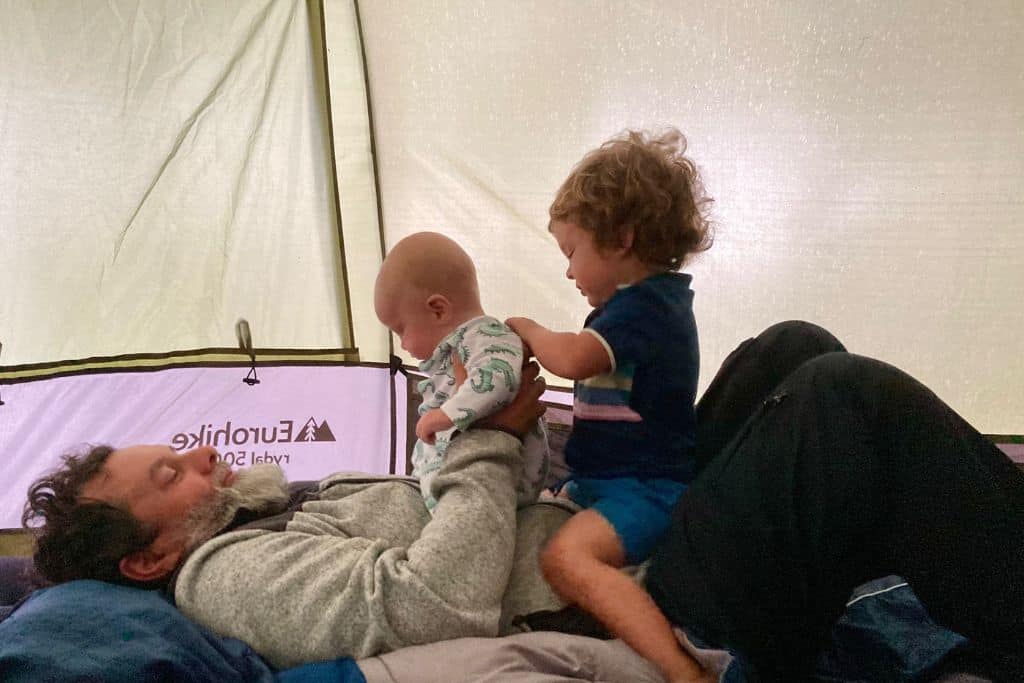
When we did our month-long road trip in Portugal, we knew that we had to make sure that Carl could put the tent up on his own. Just in case I was busy entertaining both boys and couldn’t help. So, whilst we did want to have plenty of room we didn’t want one that was so large that he couldn’t pitch it on his own. Another option would have been a pop-up type of tent. These can be great as you open the bag, take them out and they simply pop up into shape without the need to put the poles together. However, these aren’t always the strongest of tents if you’re planning in exploring more exposed areas, such as beaches where the wind can build up and blow them around.
3. Finding a Campsite
You may already have a preference for a type of camping and campsite that you like. We tend to mix up the sort that we do. For instance, we love to wild camp in national parks as it gets you to more off-grid places. And it’s free means that you can save money. We also love to go to small serviced campsites too. Especially independent ones which might be on a farm or something similar. In Biarritz we went to a mega campsite with its own skate park, water park, and massive selection of places to eat, drink and be entertained. Which we also enjoyed.
Before you go on your first camping trip you’ll want to make sure that you find the right campsite for you. Depending on the time of year and where you are going, you’ll probably find it’s a good idea to book in advance. To choose which campsite to go to, there are a few things you’ll probably want to consider. For instance, do you want a serviced pitch, with water and electricity, or not? Through to things such as if they have a play area, a swimming pool, a cafe or a shop. We always decide where we want to go and what we’d like on a campsite before starting our search.
There are some great websites that you can use to find the perfect campsite:
- UK – pitch.com
- United States – reserveamerica.com
- Europe – camping.info
- Australia – campstay.com
4. Choosing the right camp spot
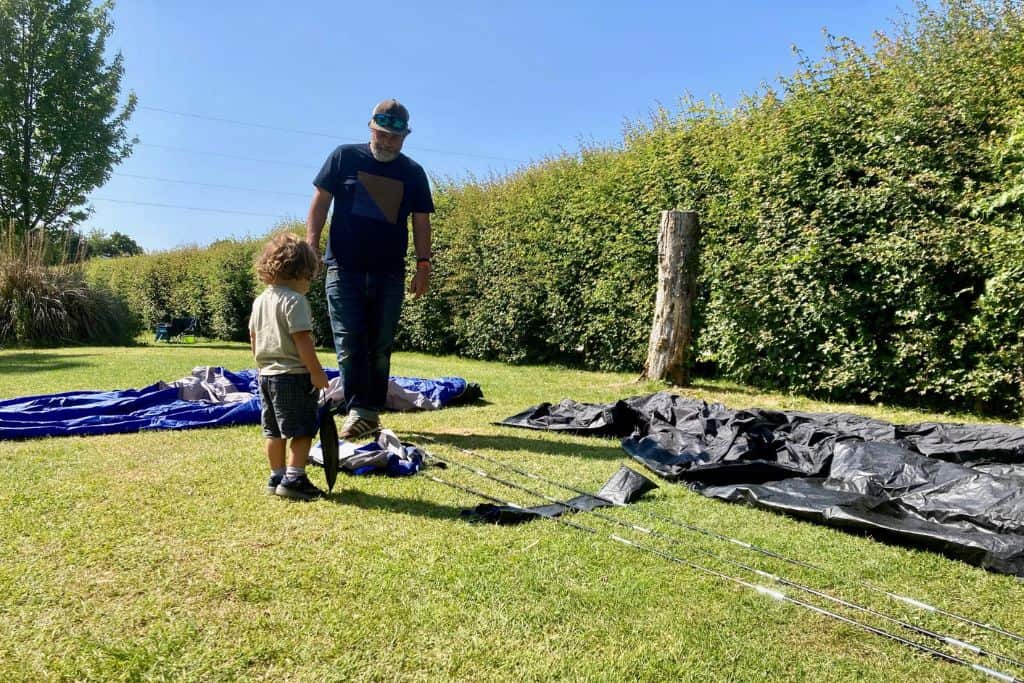
When you pick your camp spot you should ideally find somewhere flat that has no gullies or holes. You should also think about avoiding any low areas, because, you don’t want to find your tent in puddle the next morning after a nighttime of rain. If your baby has started to move around already then you won’t want to have your camp near a steep drop or water like a lake. It’s always worth asking when you check in where the best spot for camping with a baby or young kids is, as they’ll have local knowledge to share with you.
It’s also worth considering the style of camping you’ll enjoy with your baby, because you may perhaps loved to wild camp per kids. However, now that you have a baby, picking somewhere with some amenities such as showers and onsite toilets and could make a huge impact on how much fun your camping experience is.
It’s not always possible, however, picking a pitch away from other campers is a good idea. Particularly if your baby is a bit noisy throughout the night. Generally everyone understands, however, it’s only fair to think about other campers in this situation. Remember, they might want a good night’s sleep without being woken by a noisy baby whether it’s the day or the night.
Having enough shade can sometimes be problematic if you’re camping with a baby or young children. So, we always look for a camp spot with some trees for natural shade if they have some. Tents will get very hot from the direct sunlight during the day, so seeking out some shade in the summer helps keep you, your tent and your kids cooler.
5. Setting up camp
The type of camping set-up you choose will depend on your style of camping and where you’re going. We’ve seen some people who bring a full-on camping set-up. They can include a kitchen gazebo, central lounge area and even a dressing-room tent (that was at a festival!). We like to take a “camp-lite” approach as we tend to road trip a lot. This means we only take the bare minimum – less to pack and unpack! For instance, rather than take a table and chairs with us, we tend to use the picnic tables on site.
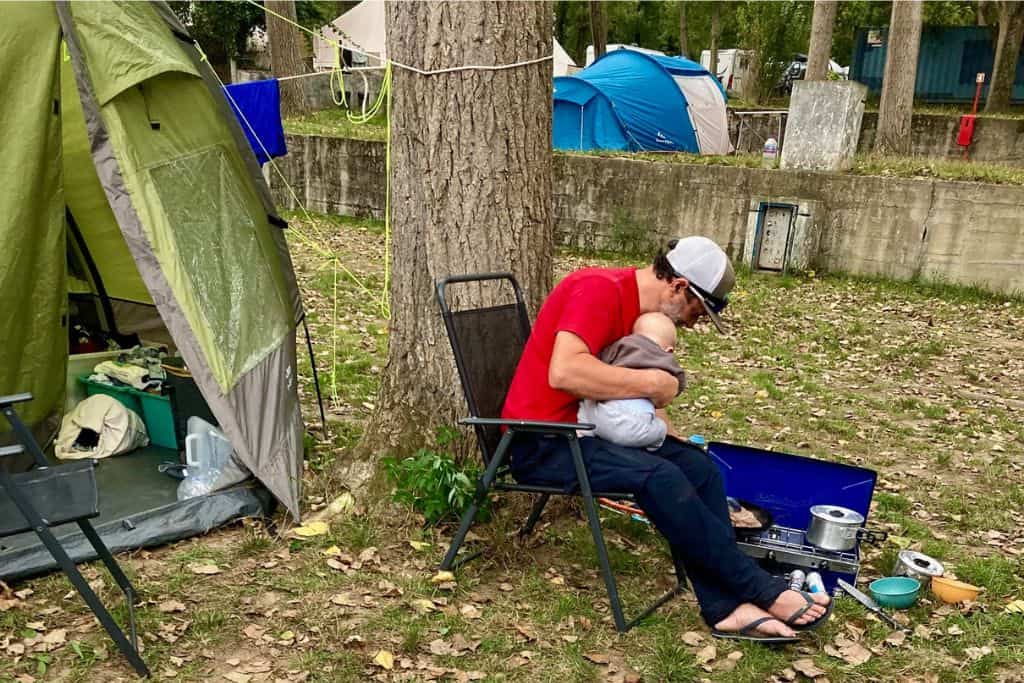
In the daytime we’d suggest that you keep your tent ventilation panels in the windows and doors open. You should have a good quality mosquito net as part of the windows and doorways and it’s a great plan to keep them zipped up so that the inside of the tent remains insect-free. At the end of the day we always zip up our windows and doors as this helps to keep the inside dry and stop little one from escaping in the morning if they wake up before you do (which has happened to us!).
6. How to protect your baby from bugs when you’re camping
Depending on where you are staying you might need to consider some sort of bug spray or insect repellent. We’ve discovered that there are some great ones that are specially formulated with babies in mind. We know this because Cameron got so badly bitten as a baby by mosquitos. In fact, we now have a pop-up mosquito net where we can safely put him at night to escape them.
You might want to keep some after-bite cream in your baby’s first aid kit. That way you have it on hand should they get bitten.
7. Meal times with a baby
Depending on the age of your baby and what they are eating and drinking will affect what you need to take.
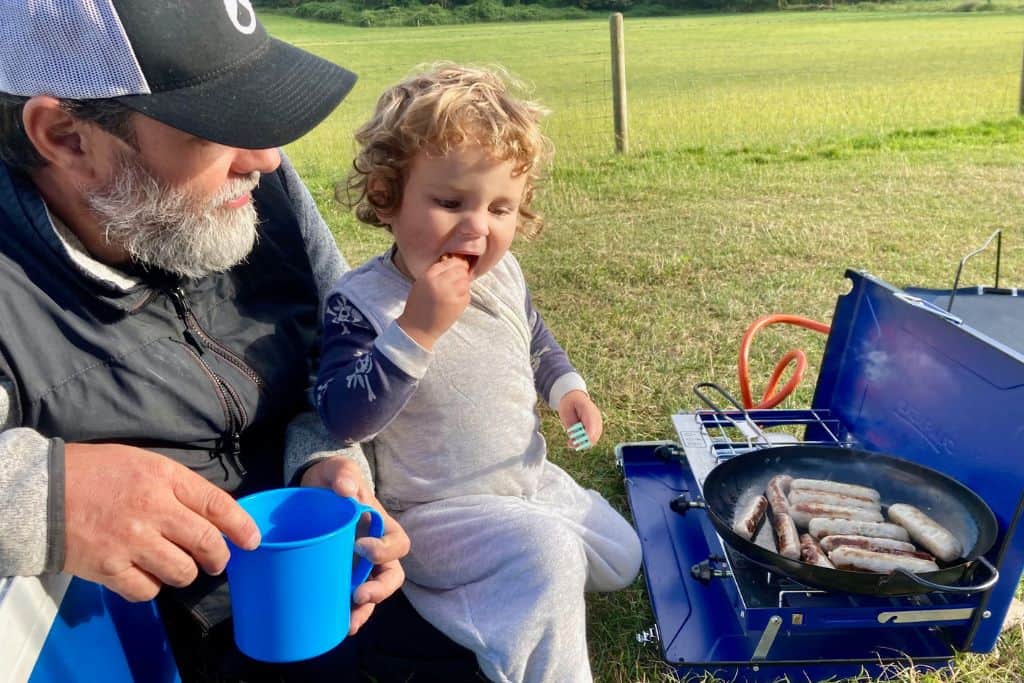
Babies
If you’re breastfeeding then going camping probably shouldn’t be too different to what you do at at home. As there isn’t any specific equipment that you need to bring with you.
If you’re wild camping then we’d suggest you bring plenty of suitable drinking suitable water so that you can keep properly hydrated. When you’re in a campsite then they’ll clearly mark out which is their drinking water. If you’re ever unsure then either purify or boil the water before using it. This is especially important if you’re wild camping and using river water.
Wear layers at night, and lots of them – speaking from personal experience, it’s a good idea to wear warm breastfeeding layers to prevent mama from getting cold during those night feeds. I wore a breastfeeding vest top under a feeding hoodie. If you need a breast pump when camping then portable pumps is a good idea for camping.
Young children
For babies eating solid food you’ll need to do a little more prep before setting off for your camping trip. Some campsites have great communal fridges that you can use, and tend to have them advertise on their website as a facility that they offer. Just be aware that sometimes these fridges can be really full! Or you can take a portable fridge that can either be charged from your car or an electricity point.
It can be easier to use pouches of food, which we’ve done before. If they like what you’re eating like ours do, then we just use a fork to mash up what we’re eating for them to enjoy!
8. Somewhere to sit and play
There will be times when you’ll need a safe placce put little one down to either lie or sit. You’ll want to think about what option works for you and the age of your baby. If you have a very young baby then a play mat might be the perfect solution, or a fold up baby. bouncer. As they get older you might opt for a camp chair or high chair.
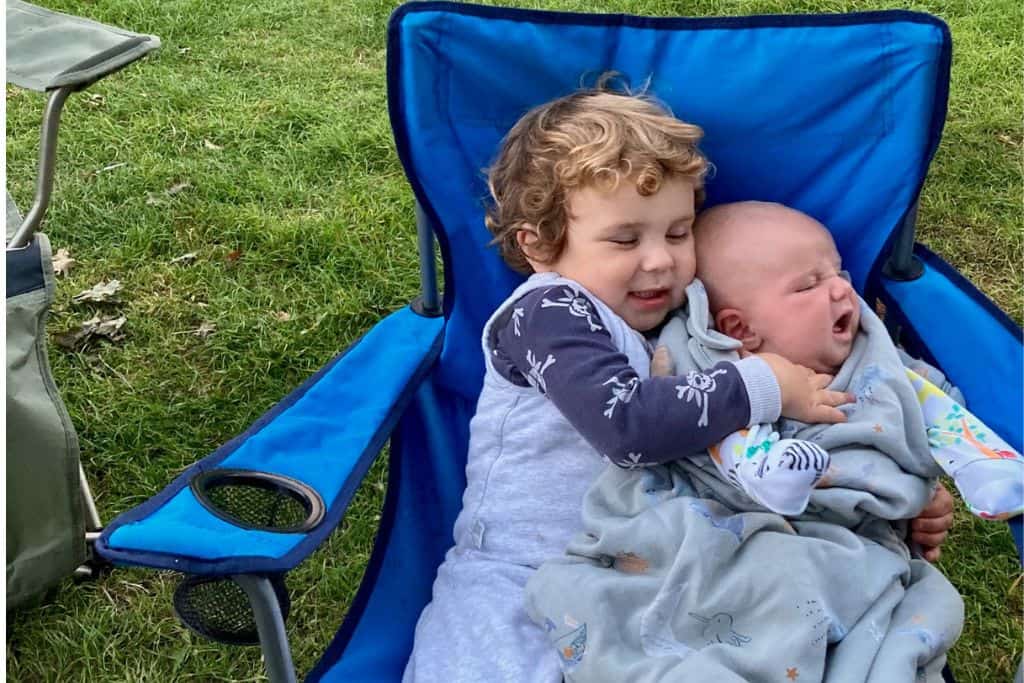
When we went to Portugal we kicked ourselves as we didn’t take our much loved BabyBjorn baby bouncer. And during our trip Dylan got to an age when he wanted to start being upright all of the time but couldn’t sit on his own. So we found that we had to hold him a lot. If we’d had the bouncer then it would have made life a lot easier. As we could have popped him in it when we wanted to be hands-free or to play with Cameron.
We don’t take many toys when we camp or travel. We tend to make things as we go, because things like sticks are great toys! We’d suggest taking toys that can get grubby and dirty. Because the fun about with, is that they’ll spend a lot of time (potentially) on the dirty ground.
9. Deciding where baby will sleep
For us, sleeping in a tent, is a bit like sleeping on a boat, because both tend to be short on space! How you sleep in the tent will be based a lot on how your baby sleeps at home. So you’re likely to want to try to do the same when camping. There are three main options for sleeping with a baby in a tent that we’ve tried.
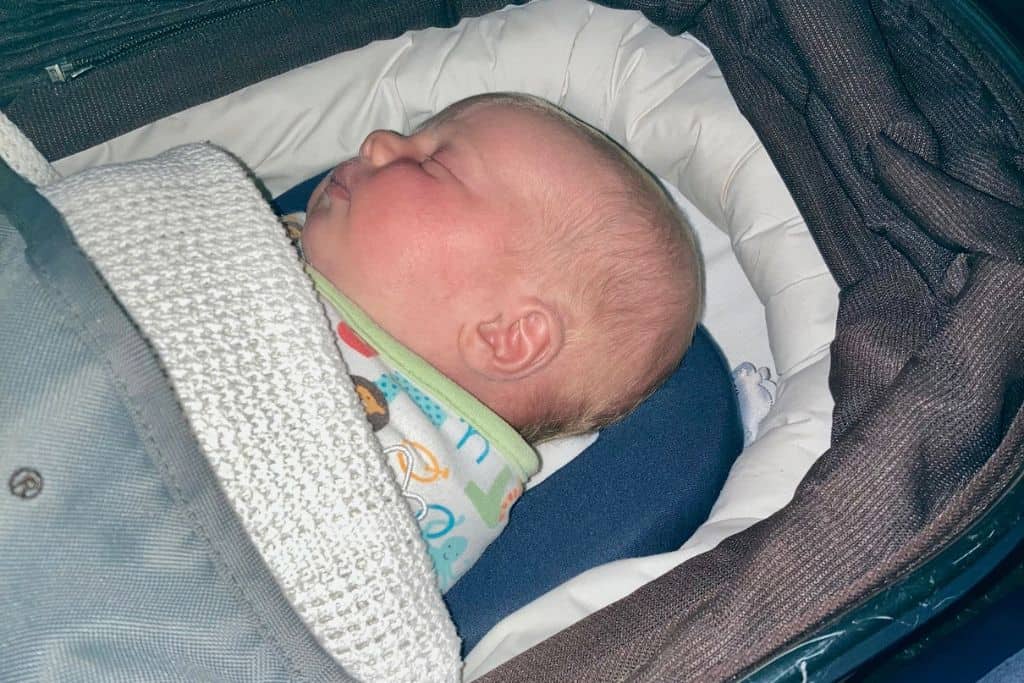
Travel cot
If you have a larger tent, they you might want to consider setting up a travel cot in one section of it. You’ll want to have a tent that is high enough for you to stand up in. A travel cot is a good idea because it is slightly raised from the ground which will help to stop your baby from getting too cold. Being raised also allows some airflow which helps stop things from getting damp. You can also get these fantastic shades for cots that black out the cot for baby yet still allow great airflow, and also act as a mossie net.
Moses Basket or Bassinet
Whilst your baby is still small you could decide to use a Moses basket or bassinet in your tent. They’re a lot smaller than a cot, however, it is likely that your baby will probably outgrow it pretty quickly. When we were camping in Portugal for a month we used the bassinet from our pram for Dylan to sleep in. It was a safe sleep one. This worked really well as we didn’t have a very large tent, and it acted like a next to me cot next to my airbed. The only thing is that he outgrew it when he was 5 months old.
Co-sleeping
Some parents co-sleep with their children for various reasons. If you decide co-sleep then the most important thing to do is to read up on the safe sleep guidelines before you do.
For us, co-sleeping whilst camping has been one of the best options. We pop Dylan down to sleep on my double mattress. We can then carry on with our evening and I can head to sleep when I’m ready. He’s a total starfish which can be a pain at times, haha. But it’s so lovely to have the cuddles that in my mind it’s worth it. When we’re not camping he spends the first part of the night in a travel cot at home, so he’s used to both.
10. How to keep a baby warm enough while camping
For Dylan’s first trip camping at 2 weeks old one of our main worries was about keeping him warm enough. We used layers of clothing and made sure his tops had long sleeves. He was in a wearable sleeping bag, so that helped to keep him warm on both is back and front. We had extra blankets ready just in case for cold weather, and also an extra layer too. We checked his body temperature a few times in the night and he was perfectly warm. In fact, he was the one that had the best sleep!
We’ve heard that merino wool thermals are a good idea if you’re going to have very cold weather. For us, the main thing to remember is that it’s all about the layers and potentially extra blankets.
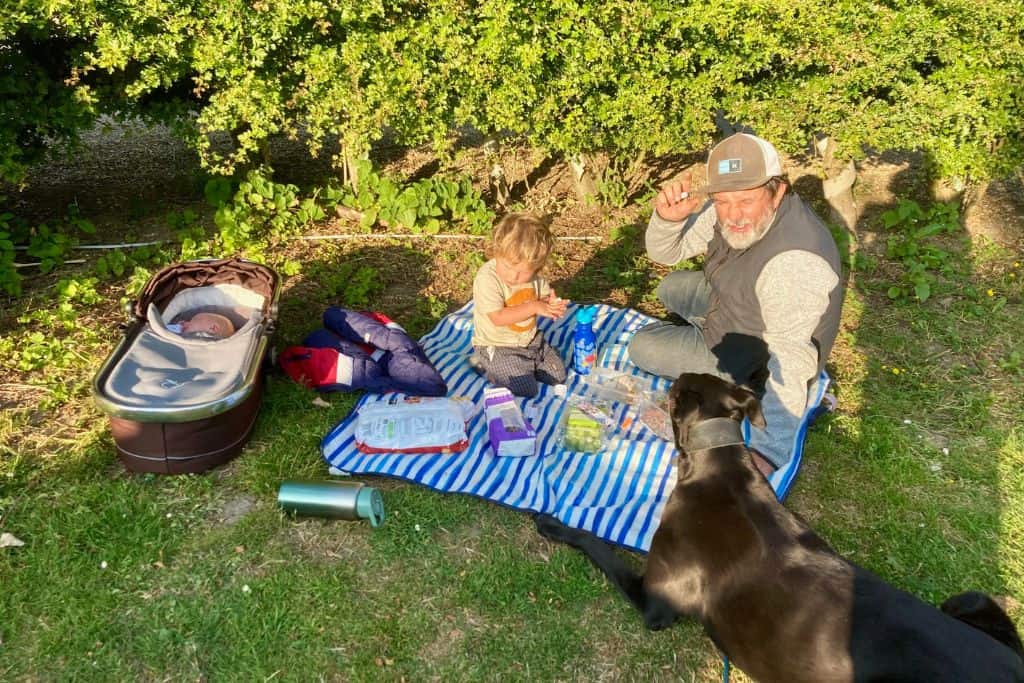
11. Be prepared for routines to change
We’ve never really had a sleep routine, as we travel so much we’ve kept life very flexible. Which has definitely helped for us and our lifestyle. The one thing for us that is consistent is that we always have a white noise machine with us. This helps to block out any strange or unusual noises when we’re trying to get either of our boys to sleep.
We’ve been camping with our friends who had a more structured routine for their baby. During our camping trip they tried to keep to their normal routine as it helps their baby sleep. They found at nap time their baby was super happy to nap in the carrier rather than their bed which they would usually do. Bedtime was a bit trickier, but they just went with the flow and their baby eventually went to sleep. It’s probably the unknown of being somewhere different.
12. How to keep you baby clean when you’re camping
If you’re away a couple of nights then you’ll want to have a plan of how you’re going to wash your. We’ve found that our boys sleep better and end up staying warmer because they’ve been washed, plus it’s a good cue to tell your baby that it’s bedtime if you generally bathe them at home before bed. We’re big fans of showering our boys as it’s generally easier when camping. Some campsites such as the ones we used in Portugal had special baby washrooms where they had a ceramic baby bath with shower hose – amazing!
If there aren’t any showers at your campsite or you’re wild camping, then you can set up a warm bath for them. A great option is to use a collapsible sink. Maybe the same one you use for washing dishes, as a makeshift bath. Start by boiling some water (we use a jetboil) then put colder water in the tub before then adding the hot water. This should make a lovely nice warm sink bath for washing your baby!
13. Using nappies whilst camping
Before you go, you’ll want to figure out how many nappies you’ll be taking. And then, we’d recommend packing some extra on top, because (a bit like with snacks) it’s better to have more, than not enough. If you’re campsite has a shop or there’s a local one nearby then maybe this is less important – we always pack loads “just in case”. And don’t forget to take lots of nappy bags and wipes. That’s because they’re helpful when you’re camping, not just at changing time. If you’re wild camping then you’ll need to be prepared to carry out your nappies at the end, some sort of airtight bag works really well to contain the smell during your trip.
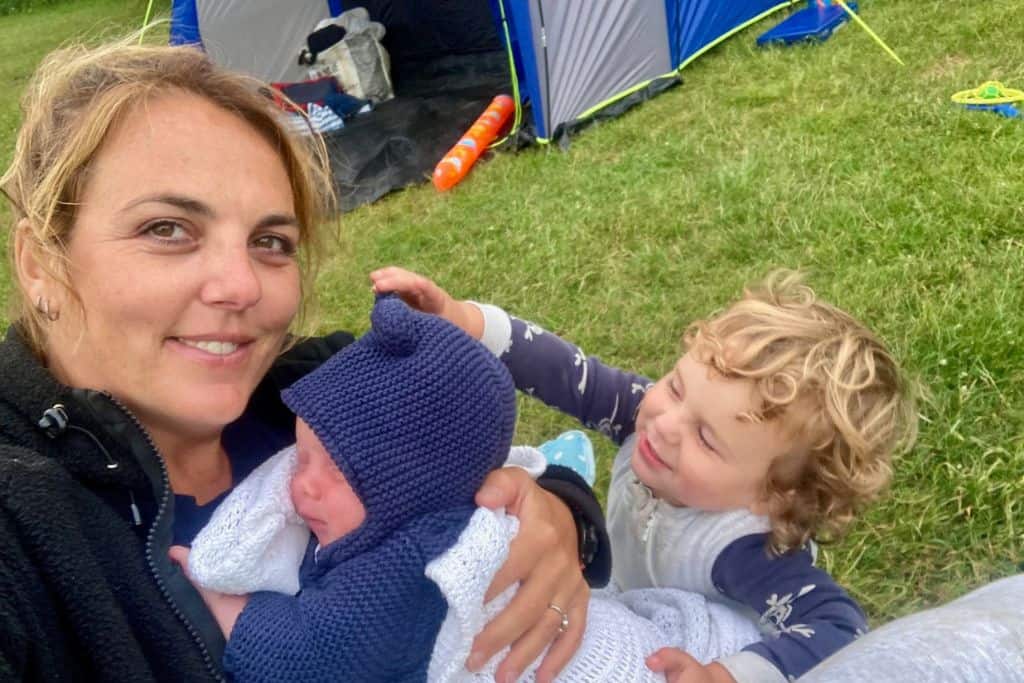
14. Bring a baby carrier
We’re big on baby wearing and using a baby carrier. It helps at times when you need to give some cuddles to your baby and also be hands free. Carl was great at putting our tent up on his own, however, he would still need some help holding it in place for a few moments as he put the tent pegs in. Being about use the baby carrier meant I could help. We also like to go exploring when we camp, and often outside of the campsite the terrain isn’t always suitable for a pram.
For Cameron our eldest, we use a backpack carrier as this is more comfortable to wear as he’s heavier.
15. Bring a stroller or pram
A great quality off-road pram is another great idea for a camping trip with a baby. However, if your plans include hiking or heading somewhere off the beaten path then a a baby carrier is a much better option. We tend to have both on hand just in case we have a change of plans!
We have an off-road one that we’ve loved and used for both of our boys. It’s great as the bassinet part is sleep safe and was where Dylan slept during camping trips up until he was 5 months old and too big for it. The great thing about a pram is that it can double up as a seat for you baby when you need to put them somewhere safely. And you can also pop in stuff into the bottom of it if you’re moving around, perfect for summers at festivals!
16. Staying for two nights or more
When it’s you first time camping with a baby then you might find it easier to camp for more just one night the first time. That’s because you might find the first night is a bit challenging as everyone (you and the baby) get used to camping. Your baby might, for example, find that something like some different noises or even lack of noise strange. After the first night, things should feel easier as you all get into the rhythm of things.
Please remember, things happen a lot slower when you’re camping with a baby, so it’s good to plan a couple or more days away. You’ll hopefully, by the second night, know what works and also what doesn’t, so you’ll probably get a better night’s sleep and start to enjoy a camping adventure.
17. Essential packing list for camping with a baby
As well as the usual things that you’d pack for a trip away, like clothes and nappies, there are some extra essentials that we’d highly recommend:
- Somewhere for baby to sleep
- First aid kit
- Wearable sleeping bag
- Sun hat
- Sun shade
- Mosquito net
- Insect repellent
- Water bottle
- Camp chair
- Backpack carrier or baby carrier
- Washing-up sink for washing baby
- Steriliser tablets
- Somewhere for baby to sit
- Extra blankets
Final Thoughts on Camping with a Baby
We love camping with a baby. We started when both boys were very young children which has meant that Cameron has been camping for years. Before your first trip camping you’ll need to plan ahead so that you can make things easier for yourselves. Babies are very flexible on being able to sleep in different places and having small changes to their routines.
We hope that our tips help you to have a wonderful first trip away!
